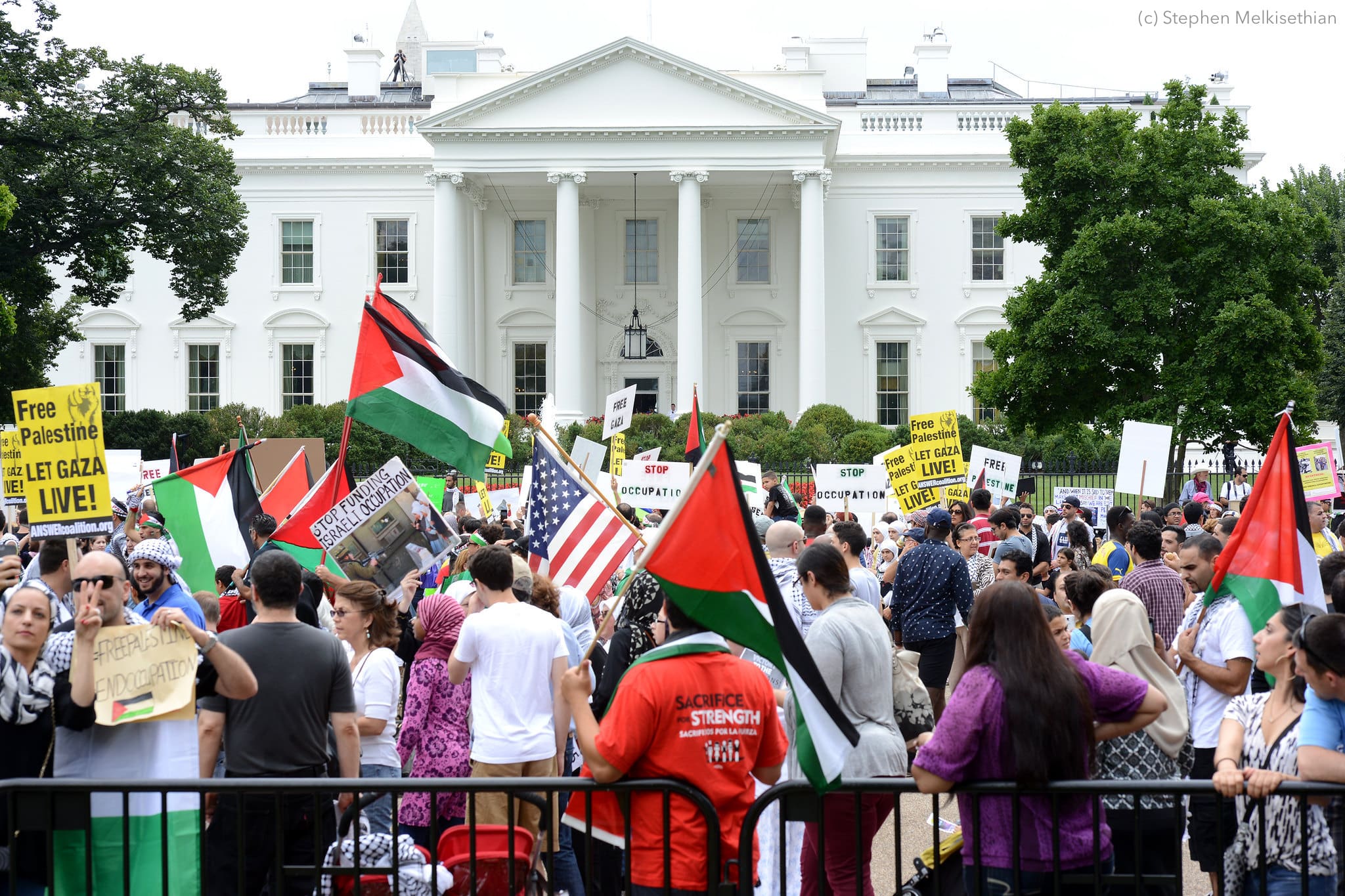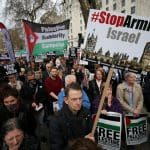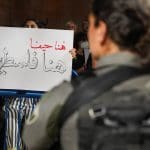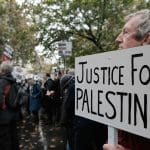
Executive Summary
Across the US, lawmakers and interest groups are ramping up efforts to shield Israel from accountability for war crimes, occupation, and apartheid. This is occurring at the cost of US Palestine solidarity advocates’ First Amendment rights to free speech and political boycotts. The implications are far-reaching: not only are anti-boycott laws limiting spaces for Palestine solidarity, they represent the first step in a wider assault on the constitutional protections designed to safeguard US citizens’ rights to advocate for justice. US citizens must take matters into their own hands to defend their constitutional rights. This policy brief recommends several steps that should be taken in order to do so.
As of October 2022, bills and executive orders designed to penalize those participating in boycotts of Israel have been introduced in 34 states and apply to over 250 million US citizens. In 2018, The Arkansas Times, a local newspaper based in Little Rock, sued the state of Arkansas after an advertising contract with a public university was withdrawn as punishment for refusing to relinquish their right to boycott Israel. In July 2022, the Eighth Circuit Court became the highest-level court to consider the issue when it ruled against the newspaper, stripping it of its right to boycott. This ruling, which is binding to Arkansas, Iowa, Minnesota, Missouri, Nebraska, North Dakota, and South Dakota, is a sign of what may be to come.
The ongoing proliferation of anti-boycott bills, recently described by Human Rights Watch as “part of an increasingly global campaign” against Palestine rights advocates, has been spearheaded by the Israeli regime itself. Over recent years, Israel has successfully bypassed US foreign interference laws by establishing non-governmental organizations through which it funnels millions of dollars to US groups who then advocate for anti-BDS legislation. But the Israeli regime is not alone. The war on boycotts of Israel is being led by the same reactionary lawmakers and interest groups, including evangelical Christian organizations, actively engaged in undermining the tenets of a healthy democracy. To be sure, this is a bipartisan effort.
While the judiciary can prove instrumental in countering attempts to curb constitutionally protected rights, US citizens should not depend upon it alone to safeguard civil liberties. That is, while only 59 of the 261 anti-boycott bills introduced have so far been passed at the state and local levels, the pro-Israel lobby continues to adapt. As long as the Boycott, Divest and Sanctions (BDS) movement remains under assault, so too is the right to use boycotts as a tool for advocacy on a range of issues. In other words, the ongoing crackdown on freedom to boycott has wider implications, even for US citizens who do not support the BDS movement.
In fact, several states have already used anti-BDS legislation as a template for “copycat laws” that would criminalize other boycotts and forms of protest, such as preventing businesses from boycotting fossil fuels and firearms industries. Since 2017, 38 states have enacted anti-protest bills, mostly in reaction to the Black Lives Matter (BLM) movement and environmental protesters. Heightened voting restrictions in key swing states are making it increasingly difficult for US citizens to carry out their civic duty. As a result, black activists and other disadvantaged communities are disproportionately targeted.
The willingness to trample upon the rights of Palestinians and their allies is opening the door to a larger assault on civil society and the core tenets of a healthy democracy. It is critical to raise awareness, mobilize grassroots activism aimed at pressuring lawmakers, and develop stronger checks to a flawed system. More specifically:
- Members of Congress should fulfill their constitutional duty to defend the rights of US citizens, including the First Amendment right to participate in political boycotts. This means voting against pending federal anti-boycott legislation.
- Activists, civil rights defenders, and concerned citizens should contact their representatives to express opposition to laws that restrict their right to boycott. They should highlight the intersectional nature of this assault on social and political expression, and organize alongside other groups being affected by copycat legislation.
- As workers across the country unionize at the highest rates in decades, civil society organizations should prepare union leaders and members to collectively mobilize against attempts by employers to revoke constitutionally protected rights. Trainings and briefings should prepare union leaders to explicitly incorporate the right to boycott into their labor demands and provide support to Palestinian or pro-Palestine workers who are targeted for their engagement in boycotts or other forms of political protest.
- Activists, academics, and NGOs should coordinate efforts to produce informational material for public campaigns aimed at raising general awareness and providing US citizens with tools to advocate for their constitutionally-protected rights.
Overview
Across the US, lawmakers and interest groups are stepping up efforts to shield Israel from accountability for war crimes, occupation, and apartheid. They are doing so by restricting Palestine solidarity advocates’ First Amendment rights to free speech and political boycotts. In June 2022, the Eighth Circuit Court of Appeals ruled to uphold an Arkansas law punishing state contractors who boycott Israel. Since 2014, dozens of states have adopted similar laws designed to punish individuals and companies that refuse to do business with those who profit from the Israeli regime’s occupation. They are also actively silencing calls for boycott, divestment, and sanctions that pressure Israel to comply with international law.1
The message to US citizens is clear: Take action to hold Israel accountable for its crimes and you will pay. The implications are far-reaching: Not only are anti-boycott laws limiting spaces for Palestine solidarity, they represent the first step in a wider assault on the constitutional protections designed to safeguard US citizens’ rights to advocate for justice. Following the Eighth Circuit decision in Arkansas, the issue is now expected to move to the Supreme Court, setting the stage for a ruling that will have significant long-term implications for the rights of all US citizens to engage in any kind of politically motivated boycott and advocate for change.
This policy brief situates the recent trend of US anti-boycott legislation within the coordinated push to crack down on the increasingly effective Boycott, Divestment, Sanctions (BDS) movement. It also explains how, by targeting the right to boycott, reactionary forces are eroding US citizens’ ability to leverage their long-standing, constitutionally protected rights to demand justice and political change both at home and abroad. With their right to boycott being threatened by an increasingly conservative and partisan judicial system, US citizens must take matters into their own hands to defend their constitutional rights. This policy brief recommends several steps that should be taken in order to do so.
Anti-Boycott Legislation: The US National Context
As of October 2022, bills and executive orders designed to penalize those participating in boycotts of Israel have been introduced in 34 states and apply to over 250 million US citizens. The laws are as absurd as they are troubling. In 2017, officials in Texas blocked access to hurricane disaster relief funds from those who refused to renounce their right to engage in BDS, only conceding the rule as a misapplication of the law after facing public pressure. In 2018, Bahia Amawi, a child speech pathologist in Texas, sued the state after losing her job for refusing to pledge that she “will not boycott Israel” or illegal Israeli settlements.
That same year, The Arkansas Times, a local newspaper based in Little Rock, sued the state of Arkansas after an advertising contract with a public university was withdrawn as punishment for refusing to relinquish their right to boycott Israel. In July 2022, the Eighth Circuit Court became the highest-level court to consider the issue when it ruled against the newspaper, stripping it of its right to boycott. This ruling, which is binding to Arkansas, Iowa, Minnesota, Missouri, Nebraska, North Dakota, and South Dakota, is a sign of what may be to come.
Whether by prohibiting state contracts who support BDS or threatening to cut ties with investment agencies, the Israeli regime’s defenders are forcing US citizens to choose between their First Amendment rights and their livelihoods Share on X
Federal district courts in Arizona, Georgia, Kansas, and Texas have blocked the enforcement of their states’ anti-boycott laws, considering them unconstitutional compelled speech and violations of the First Amendment. However, instead of discarding them on the grounds that the government cannot force an individual or group to support certain political expressions, these laws are being amended and reintroduced. Several states have amended their anti-boycott laws to exclude individuals and sole proprietors; however, larger companies that conduct more than $100,000 worth of business with the state continue to face anti-boycott certification requirements.
State legislators have also placed financial burdens on companies accused of boycotting Israel through blacklists and pension fund divestments. Efforts to shield Israel from the human rights standards applied across the globe are likewise extending into sustainable investing and corporate governance. In September 2022, South Carolina’s treasurer joined a growing list of officials threatening to cut ties with the multibillion-dollar investment firm Morningstar over claims that their Sustainalytics program’s environmental, social, and governance (ESG) rating is biased against Israel. ESG ratings, which assess ethical corporate practices ranging from environmental standards to labor practices, have proven integral in holding companies accountable regardless of where they operate. Indeed, Sustainalytics drew attention to Israel’s documented human rights violations in the assessments it provided to investors.
In the face of mounting pressure, Morningstar hired an independent review commission to carry out an exhaustive investigation into any potential bias. The investigation found “neither pervasive nor systemic bias against Israel in Sustainalytics products and services;” however, this has failed to bring an end to the smears against the rating system. Missouri Attorney General Eric Schmitt decried Morningstar practices as “woke ESG investing,” and Arizona Treasurer Kimberly Yee suggested that the very idea of reviewing Israeli companies for the same standards to which all other companies are held was anti-Semitic. This, despite the fact that Morningstar’s chief executive officer, Kunal Kapoor, repeatedly insisted that his company does not support the BDS movement and that the Sustainalytics assessment merely provided a warning for investors, rather than a call to boycott.
Since then, Morningstar has caved to pressure from the pro-Israel lobby, adopting a host of anti-Palestinian measures that include refraining from both references to the West Bank as “occupied” as well as reliance on reports issued by the UN Human Rights Council. Clearly, to the pro-Israel lobby, Israeli companies should not be held to the same human rights, labor, and environmental standards as other companies. As a result, whether by prohibiting state contracts who support BDS or threatening to cut ties with investment agencies, the Israeli regime’s defenders are forcing US citizens to choose between their First Amendment rights and their livelihoods.
Who is Behind These Bills?
The ongoing proliferation of anti-boycott bills, recently described by Human Rights Watch as “part of an increasingly global campaign” against Palestine rights advocates, has been spearheaded by the Israeli regime itself. Over recent years, Israel has successfully bypassed US foreign interference laws by establishing non-governmental organizations through which it funnels millions of dollars to US groups who then advocate for anti-BDS legislation. But the Israeli regime is not alone. The war on boycotts of Israel is being led by the same reactionary lawmakers and interest groups actively engaged in undermining the tenets of a healthy democracy.
Some of the most vociferous proponents of anti-BDS efforts in the US are conservative interest groups and evangelical Christian organizations that are engaged in a nationwide campaign to roll back hard-fought liberties. For example, the American Legislative Exchange Council (ALEC), an ultra-conservative venture backed by the Koch brothers, drafts legislation for state and federal governments on behalf of corporate interests. In addition to unconditionally shielding Israel from accountability and drafting anti-BDS bills for conservative lawmakers, groups like ALEC have also targeted public education, climate activism, and LGBTQ+ rights, while defending the “Stand Your Ground” laws, bans on Critical Race Theory and the Supreme Court’s June 2022 reversal of Roe v. Wade. Meanwhile, groups like Christians United for Israel (CUFI) smear BDS activists through advocacy campaigns on university campuses, as well as in churches and across social media. These alliances prove that being pro-Israel in the US also means being complicit in conservative efforts to sustain white supremacy, roll back reproductive and LGBTQ+ rights, and weaken democracy.
Being pro-Israel in the US also means being complicit in conservative efforts to sustain white supremacy, roll back reproductive and LGBTQ+ rights, and weaken democracy Share on X
What is more, efforts to roll back the right to boycott have also represented a bipartisan affair. In 2016, New York’s former governor, Andrew Cuomo, signed an executive order blacklisting businesses that refused to do business with Israel. He put it bluntly: “if you boycott against Israel, New York will boycott you.” Three years later, Senator Joe Manchin (D – WV) co-authored the Combating BDS Act alongside Senator Marco Rubio (R – FL), which aimed to give legal cover to various state anti-BDS laws before it was blocked on the Senate floor. In August 2022, New York State Assemblyman Dan Rosenthal joined 18 Republicans in their campaign against Morningstar for warning investors of Israel’s human rights record. While the bipartisan tradition of providing unconditional support to Israel is waning, democratic establishment holdouts continue to side with conservatives against progressive voices, both in the electorate and in the halls of Congress.
Constitutionally Protected Rights Under Threat
US citizens have long leveraged their right to boycott as a means of making their voices heard. From the pre-Civil War boycott of goods produced with slave labor, to the 1955 Montgomery bus boycott that called for an end to racial segregation, boycotts have proven a vital tactic in challenging human rights abuses and fighting for political change in the US. The tactic has also been wielded against injustice abroad; indeed, economic, cultural, and even academic boycotts proved instrumental in bringing an end to the apartheid regime in South Africa. However, many exhibit a disturbing selective intolerance for the right to boycott when it comes to holding Israel accountable.
Political boycotts are widely viewed as a cornerstone of the First Amendment, both by the US public and as a matter of legal precedent. In NAACP v. Claiborne Hardware Co. (1982), the most regularly cited precedent on the issue, the Supreme Court ruled that a state’s right to regulate economic activity “could not justify a complete prohibition against a nonviolent, politically motivated boycott.” That case began in 1966, when the local NAACP chapter in Claiborne County, Mississippi, coordinated a boycott of white-owned businesses, calling for local government and business leaders to meet their demands for racial justice. White business owners affected by the boycott sued the NAACP and the action organizers for economic damages.
After the case made its way through the lower courts, the Supreme Court ruled that the NAACP’s boycott was protected by the constitution because it was composed of elements protected by the First Amendment — namely, speech, assembly, and petition. Justice John Stevens emphasized the boycott’s end goal in the ruling, noting: “the purpose of petitioners’ campaign was not to destroy legitimate competition,” but rather, to “vindicate rights of equality and of freedom.” In part, the court found it persuasive that the boycott was wielded for an expressive purpose: a list of racial justice demands.
In the NAACP v. Claiborne case, the Supreme Court found that through constitutionally protected acts of speech, assembly, and petition, “petitioners sought to change a social order that had consistently treated them as second-class citizens.” By this logic, the right to boycott Israeli goods produced in the West Bank — an act that inherently involves the aforementioned constitutionally protected activity — falls squarely within US citizens’ constitutionally protected rights. While courts in Arizona, Georgia, Kansas, and Texas confirmed this logic, the Eighth Circuit Court ruling in Arkansas serves as a reminder of how easily precedent can be overturned.
Understanding the Eighth Circuit Court Ruling
In 2018, The Arkansas Times sued the state after being asked to sign a pledge not to boycott Israel in order to maintain an advertising contract with the University of Arkansas. After the suit was initially dismissed, the newspaper appealed, and a three-judge panel from the Eighth Circuit overturned the ruling, finding that the statute “imposes a condition on government contractors that implicates their First Amendment rights.” The state then requested that the full Eight Circuit – known to be one of the most conservative circuit courts in the country – rehear the case, resulting in the June 2022 ruling against The Arkansas Times.
While affirming that requiring someone to “give up a constitutional right” in order to receive a government contract does “impose an unconstitutional condition,” the Eighth Circuit Court went on to reinterpret precedent – namely, the protections set in NAACP v. Claiborne. The ruling argued that constitutional First Amendment protections apply only to the expressive actions that accompany a boycott. In other words, the speeches, petitions, and marches that promote a boycott are protected by the First Amendment, while the actual act of economically boycotting an entity is not. Along this line of reasoning, the Eighth Circuit decided that the act of economic boycott itself was considered an example of “non-expressive” conduct.
The Eighth Circuit’s decision has attracted widespread criticism from those who claim that the judges misrepresented the precedent entirely. NAACP v. Claiborne clearly establishes that the right to boycott is protected by the First Amendment, and when Supreme Court judges analyzed each of the associated elements of the boycott in that case, they did not differentiate between accompanying speech and the act of boycott itself. Justice Jane Kelly, who authored the Eighth Circuit’s dissenting opinion, took this logic further. According to Kelly, by instructing the State to consider a company or individual’s prior speech and actions to determine whether they are participating in a boycott of Israel, the Arkansas statute might deter entities from engaging in constitutionally protected acts of speech and protest unrelated to boycotts. In other words, companies and individuals might feel pressured to avoid protests and petitions that criticize Israeli policy out of concern that they may fall under the state’s definition of a boycott of Israel, “thereby limiting what a company may say or do.”
Wider Implications
While the judiciary can prove instrumental in countering attempts to curb constitutionally protected rights, such as the right to participate in the BDS movement, US citizens should not depend upon it alone to safeguard civil liberties. That is, while only 59 of the 261 anti-boycott bills introduced have so far been passed at the state and local levels, the pro-Israel lobby continues to adapt. As long as BDS remains under assault, so too is the right to use boycotts as a tool for advocacy on a range of issues. In other words, the ongoing crackdown on freedom to boycott has wider implications, even for US citizens who do not support the BDS movement.
The willingness to trample upon the rights of Palestinians and their allies is opening the door to a larger assault on civil society and the core tenets of a healthy democracy Share on X
In fact, several states have already used anti-BDS legislation as a template for “copycat laws” that would criminalize other boycotts and forms of protest, such as preventing businesses from boycotting fossil fuels and firearms industries. For example, Kentucky’s SB 205 prohibits the state from entering into contracts with companies unless they submit written certification that they will not engage in a boycott of energy companies. Similarly, Indiana’s HB 1409, if passed, will prevent the state from entering into a contract with companies without written certification that they will not discriminate against a firearm entity or firearm trade association in their business dealings.
Efforts to curtail the right to boycott represent one tactic amid an overall strategy by reactionary elements on both sides of the partisan divide to undermine democratic values in the US. If they are successful, these forces will undoubtedly direct their efforts at other forms of protest and free speech that are being leveraged in calls for justice. Since 2017, 38 states have enacted anti-protest bills, mostly in reaction to the Black Lives Matter (BLM) movement and environmental protesters. Heightened voting restrictions in key swing states are making it increasingly difficult for US citizens to carry out their civic duty. As a result, black activists and other disadvantaged communities are disproportionately targeted. The willingness to trample upon the rights of Palestinians and their allies is opening the door to a larger assault on civil society and the core tenets of a healthy democracy.
Taking Action
The Eighth Circuit decision in Arkansas, which came two days before the Supreme Court overturned Roe v. Wade’s guarantee of the right to abortion on June 24, 2022, serves as another reminder that US citizens should not count on the judiciary alone to defend their civil liberties. With this in mind, it is critical to raise awareness, mobilize grassroots activism aimed at pressuring lawmakers, and develop stronger checks to a flawed system. More specifically:
- Members of Congress should fulfill their constitutional duty to defend the rights of US citizens, including the First Amendment right to participate in political boycotts. This means voting against pending federal anti-boycott legislation like the ones introduced by Congressman Lee Zeldin (R) in March 2022 and Senator Tom Cotton (R) in July 2022, both of which are aimed at elevating state anti-boycott legislation to the national level.
- Activists, civil rights defenders, and concerned citizens should contact their representatives to express opposition to laws that restrict their right to boycott. They should highlight the intersectional nature of this assault on social and political expression, and organize alongside other groups being affected by copycat legislation. More information about how to get involved can be found at Palestine Legal, the US Campaign for Palestinian Rights (USCPR), and the American Civil Liberties Union (ACLU).
- As workers across the country unionize at the highest rates in decades, civil society organizations should prepare union leaders and members to collectively mobilize against attempts by employers to revoke constitutionally protected rights. Trainings and briefings should prepare union leaders to explicitly incorporate the right to boycott into their labor demands and provide support to Palestinian or pro-Palestine workers who are targeted for their engagement in boycotts or other forms of political protest.
- Activists, academics, and NGOs should coordinate efforts to produce informational material for public campaigns aimed at raising general awareness and providing US citizens with tools to advocate for their constitutionally-protected rights. The recent documentary film Boycott (2021) serves as an example of how to mobilize free speech activists, as well as the general public, who may still be unaware of the wider consequences of these coordinated anti-BDS campaigns when it comes to the assault on constitutionally protected rights.
- To read this piece in French, please click here. Al-Shabaka is grateful for the efforts by human rights advocates to translate its pieces, but is not responsible for any change in meaning.
Tariq Kenney-Shawa is Al-Shabaka’s US Policy Fellow and co-host of Al-Shabaka’s Policy Lab series. He holds a Masters degree in International Affairs from Columbia University. Tariq’s research and writing have covered a range of topics, from the role of open-source intelligence in exposing Israel’s war crimes to analysis of Palestinian liberation tactics. His writing has appeared in The Los Angeles Times, Foreign Policy, and The Nation, among others. Follow Tariq on Twitter @tksshawa and visit his website at https://www.tkshawa.com/ for more of his writing and photography.














